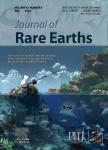Solid-state synthesis of LnOCl/Ln_2O_3(Ln=Eu, Nd) by using chitosan and PS-co-P4VP as polymeric supports
Solid-state synthesis of LnOCl/Ln_2O_3(Ln=Eu, Nd) by using chitosan and PS-co-P4VP as polymeric supports作者机构:Departamento de Quimica Facultad de Quimica Universidad de Chile Departamento de Quimica Organica e Inorganica (IUQOEM) Facultad de Quimica Universidad de Oviedo Universidad Autonoma de Chile Facultad de Ingenieria Instituto de Ciendas Quimicas Aplicadas Inorganic Chemistry and Molecular Material Center
出 版 物:《Journal of Rare Earths》 (稀土学报(英文版))
年 卷 期:2018年第36卷第12期
页 面:1326-1332页
核心收录:
学科分类:0709[理学-地质学] 0819[工学-矿业工程] 08[工学] 0708[理学-地球物理学] 0805[工学-材料科学与工程(可授工学、理学学位)] 080502[工学-材料学] 0703[理学-化学]
基 金:Project supported by Fondecyt Project(1160241)
主 题:EuOCl/Eu_2O_3 NdOCl Solventless method Luminescence Lanthanides Rare earths
摘 要:A series of lanthanide materials of type LnOCl or Ln2O3(Ln = Eu, Nd) were successfully prepared via a convenient and straightforward two-step procedure. Firstly, and by using chitosan and PS-co-P4 VP as polymeric supports, macromolecular complexes of type chitosan ·LnCl3and PS-co-P4 VP·LnCl3 were prepared. These macro molecular complexes were treated in solid state at 800 ℃ under air, leading to the corresponding LnOCl or Ln2O3materials(Ln = Eu, Nd) with moderate to good yields. The nature of the asprepared lanthanide materials(LnOCl and/or Ln2O3) is strongly influenced by the polymeric template(i.e.,chitosan or PS-co-P4 VP), the lanthanide salt precursor, and the polymer/lanthanide molar ratio. Thus, when chitosan · EuCl3and PS-co-P4 VP·EuCl3are used as macromolecular precursors, a mixture of crystalline phases of both EuOCl and Eu2O3are obtained. However, when chitosan· NdCl3and PS-co-P4 VP· NdCl3are used, a sole pure crystalline phase of NdOCl is obtained. The nano structured lanthanide materials were characterized by means of XRD(X-ray diffraction of powder), SEM, EDS, TEM, and HRTEM. The luminescent spectra of the asprepared EuOCI/Eu2O3mixture materials show an emission pattern whose intensity is strongly influenced by the nature of the polymeric precursor, as well as on the metal/polymer molar ratios.



